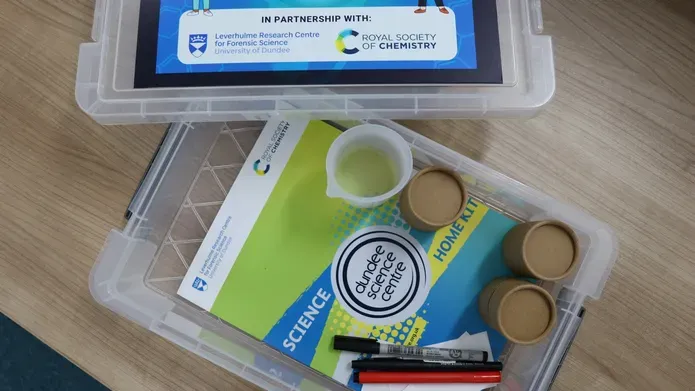Public engagement project
Crime Lab Chemistry - Forensic Chemistry experiments for the classroom and at home
Learn first-hand some of the techniques forensic scientists use to detect chemicals and illicit drugs with these experiments you can do at home.

Active
July 2023
November 2024
Funding
Funders
Royal Society of Chemistry
With funding from the Royal Society of Chemistry, the Leverhulme Research Centre for Forensic Science (LRCFS) have created a set of forensic chemistry experiments that can be easily and safely carried out in the classroom and at home. The experiments were designed by Victoria Marland, a PhD student at LRCFS specialising in the study of drug analysis and identification.
The activities are designed for children aged of 10-13 years old, who are at the age to be considering what subjects to take into standard grade/nat 5 and use equipment that is safe to be used at home.
You can access the full experiment instructions and more of the relevant background information by downloading our @Home kit booklet.
The Crime Lab Chemistry experiments overall aim to achieve the following:
- Teach children about chemistry through its application to real life forensic science work
- Demonstrate the variety of careers in chemistry
- Provide a fun learning experience with chemistry
The following experiments are included within Crime Lab Chemistry - the full details of each experiment can be accessed by downloading our @Home kit booklet.
Experiment 1: Smell pots
Based on the equipment used to train detection dogs to detect the presence of illicit drugs, this experiment introduces the concept of identifying unknown substances based on molecular differences that result in different smells.
Children are presented with 3 opaque pots and must guess what is inside each pot solely based on the smell.
By the end of the experiment, children will learn that:
- Different substances have different smells due to the presence of different molecules
- Detection dogs are trained to use their sense of smell to detect a wide range of substances (e.g. illicit drugs, explosives, missing people)
- Detection dogs have a highly sensitive sense of smell, that is many times more powerful than that of a human
- Unknown substances must be examined further should a detection dog detect an illicit substance
Experiment 2: Chromatography
This is chromatography – with a twist. Our activity links ink-based chromatography with a video demonstrating the use of chromatography in the identification of illicit drugs. Children must then use chromatography to determine which of 3 black pens was used to write a ransom note.
By the end of the experiment, children will learn that:
- Unknown substances can be identified using different scientific experiments
- Thin Layer Chromatography (TLC) is used to identify substances through a video demonstration
- How to separate out different pigments present in black ink using paper chromatography
- Separating out the chemicals that make up a substance through chromatography allows the forensic chemist to compare materials with others that may look the same but may have different chemical compositions.
- Basic calculations and the importance of maths and statistics in forensic science
Crime Lab Chemistry is designed to be delivered to children in schools and at home. With help from Carolyn Wilson - a teacher at Baldragon Academy - we developed a kit and CPD training that allows teachers to carry out the session in their school without external support. These classroom kits have been distributed to schools across Dundee and additional support has been provided by LRCFS on request.
In December 2023 over 200 @Home boxes, containing the materials and instructions to carry out the Crime Lab experiments were created and distributed across Dundee thanks to collaboration with Dundee Science Centre. As of February 2024, over 600 children have taken part in Crime Lab Chemistry.
For schools local to Dundee we can arrange to visit with a kit - if you are interested in participating in this project or wish to make any inquiries, contact the LRCFS team [email protected]
People
External team members
Carolyn Wilson - Baldragon Academy
Dundee Science Centre
Heather Doran
[email protected]